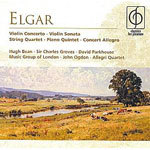
Elgar: Violin Concerto / Violin Sonata / String Quartet / Piano Quintet / Concert Allegro / Serenade
 $25.00
Out of Stock
$25.00
Out of Stockadd to cart
EDWARD ELGAR
Elgar: Violin Concerto / Violin Sonata / String Quartet / Piano Quintet / Concert Allegro / Serenade
Hugh Bean (violin) / Sir Charles Groves / David Parkhouse / Music Group of London / John Ogdon / Allegri Quartet
[ EMI Classics for Pleasure / 2 CD ]
Release Date: Friday 4 June 2004
"Recommendable ... strong on British reserve. The concerto impresses by its integrity if not through high-wire dazzle"
(MusicWeb may 2004)
"This desirable bargain double from CFP restores to availability recordings dating back to the LP era; a long-term fixture of the EMI Classics catalogue. Elgar's music has been eternally central to EMI. The company can take a bow for determining the emergence of Elgar from the despondent shadowlands of the 1950s and 1960s. The major chamber music might seem peripheral yet it lets the listener into Elgar the widower's post-war anterior world. The fact that the Piano Quintet and the solo piano pieces are played by another psychologically troubled man, John Ogdon, adds to the 'draw' of these performances.
Hugh Bean died earlier this year (2004) and he features eminently in Tully Potter's superb liner notes alongside a handsomely assertive studio portrait. He is the violinist in the Concerto and plays as part of the group he founded in the Sonata.
The Sonata is recorded and styled in a very forward way so that neither instrumentalist can be said to be subservient. That said, most of the musical interest rests with the violin, Elgar's own instrument. The Sonata is at its strongest in the mellifluous song-making of the Allegro non Troppo finale which is a little Schumann-inflected. It develops a fine surging swing in the hands of Parkhouse and Bean. As for Bean's treasurable version of the Concerto this is on the slowish side, not sleepy but clearly allowed 'world enough and time' to expand its lyrical lungs. This version does not have the drive of my first choices which would be Heifetz/Sargent or Zukerman/Barenboim. Bean does not exude charisma in the way of some soloists. Instead there is an unburnished integrity, the sort of feeling for poetry that makes his Lark Ascending with Boult such a classic. Something has been made of Bean's Sammons connection and there is a common feeling there if not the derring-do of the Sammons recording which has more storm-cloud drama than most. If you want an antidote to Elgarian 'glitz' yet avoiding the often edge-dulled predictability of Menuhin or the prolixity of Haendel in her distended version with Boult (Testament) then this is for you. Sound is downright honest, not Decca-brilliant but four-square and clear with a trace of hiss only to be expected from sessions made on iron oxide tape thirty-two years ago.
The Quintet: Ogdon (1937-1989) was an outsize personality yet he subjugates that to match the predominantly reticent role assigned by Elgar. This is thoughtful music and only flames reluctantly in the finale. Compared with the Bax Piano Quintet of five years earlier it is subdued and its melodic interest slight. However Elgar's writing in the final pages romps with a regal energy. In the Quartet the Piacevole with its comely and slightly melancholy musing comes off best of all.
Ogdon's playing of the little Serenade recognises that it is salon stuff but the substantial oddity here is the rather ramshackle rhapsodic Concert Allegro into which Ogdon infuses a confident mercurial energy.
Recommendable recordings strong on British reserve. The Bean version of the Concerto impresses by its integrity if not through high-wire dazzle."
(MusicWeb may 2004)
After Hugh Bean died on Boxing Day 2003 EMI were inundated with requests for the reissue of his famous recording of the Elgar Violin Concerto. EMI swiftly added it to the schedule, in the original CfP CD coupling of Elgar's Violin Sonata plus a second disc in which Bean leads the Music Group of London in their benchmark recording of the String Quartet; this is its first general release on CD. (The set is completed by John Ogdon and the Allegri Quartet in the remaining late chamber work, the Piano Quintet, and Ogdon in the Concert Allegro.)
Tracks:
CD1
Violin Sonata in E minor [25:19]
Violin Concerto in B minor [49:03]
CD2
Piano Quintet in A minor [34:44]
String Quartet in E minor [28:59]
Serenade [2:29]
Concert Allegro [10:30]